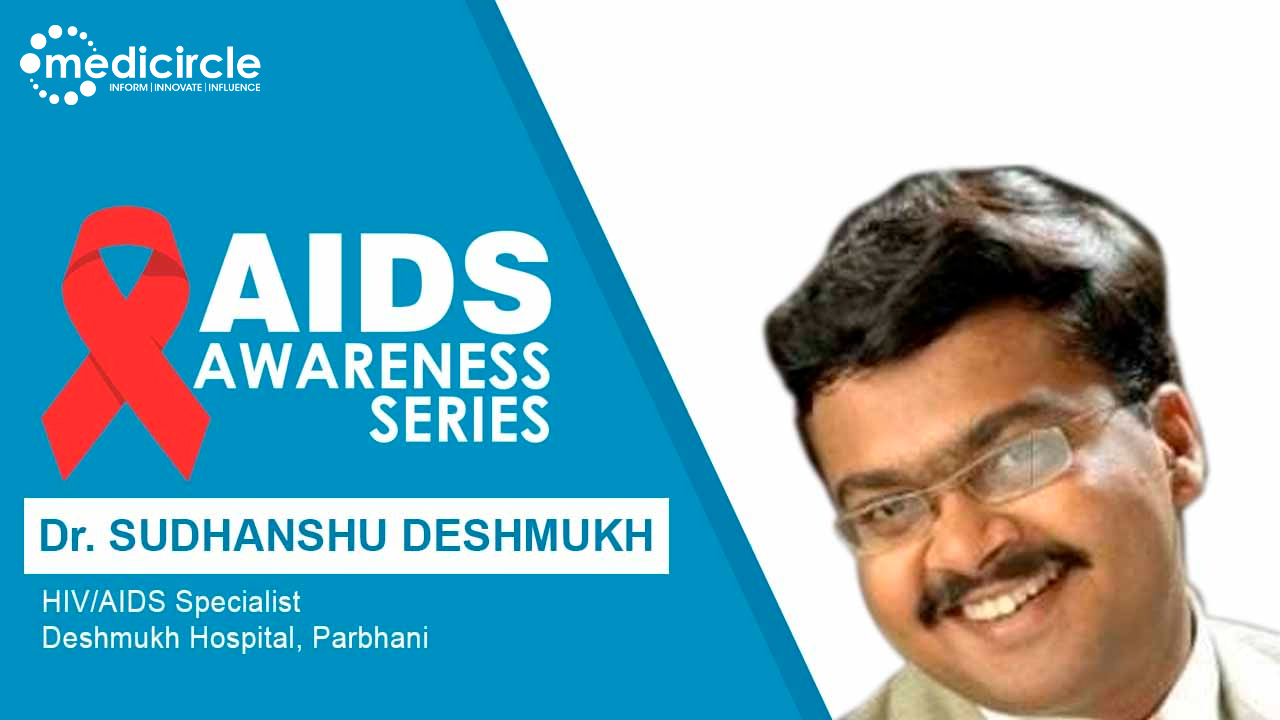Dr. Sudhanshu Deshmukh has been an HIV Specialist since 2007. He completed his MBBS in 2002 from MIMSR Medical College, Latur, and Fellowship in HIV Medicine: YRG CARE, Chennai & BROWN UNIVERSITY USA 2007. He is a Consulting Chest & HIV PHYSICIAN in Deshmukh Hospital. He had Implemented the PPTCT Program in Parbhani and surrounding districts in association with PRAYAS FOUNDATION 2008 to 2012. He has been arranging exhibitions and delivering speeches on HIV Awareness for various educational institutions, NSS Camps of Various Universities, Parbhani Police, and Home guards.
Types of HIV
Dr. Sudhanshu begins, "AIDS is Acquired Immuno Deficiency Syndrome. A group of diseases that occurs in the body owing to decreased immunity is termed AIDS. HIV (Human Immunodeficiency Virus) is the main cause of AIDS. This virus gradually weakens the body’s immunity (natural defense). There are two HIV viruses – 1 and 2. HIV 1 is the most rampant virus in India and HIV 2 is less dangerous but more prominent in North-Eastern states.
Transmission of HIV
Dr. Sudhanshu talks about modes of transmission of HIV infection
1. The most common reason is unprotected sexual intercourse with HIV infected person – Homo or hetero.
2. Through blood and blood products (during blood transfusion and sharing the same needle) – Injecting drugs
3. From parents to child
Stages of HIV infection and symptoms
Dr. Sudhanshu informs that HIV infection can be classified into four stages
1. Infection – Fever, flu
2. Asymptomatic phase – No symptoms for up to 10-15 years
3. Symptomatic phase – Pneumonia, herpes, mouth ulcers, TB. CD4 count – 350-200
4. Progression of HIV to AIDS – Sudden weight loss, neurological illnesses, diarrhea (AIDS-defining illnesses), CD4 count – 100 or 50
AIDS is not the end of life
Dr. Sudhanshu emphasizes, “AIDS is not the end of life, it is very much reversible with early diagnosis and timely treatment (commencing ART therapy on time). Now the criteria of treatment is ‘Test and Treat’ – As soon as the person becomes HIV positive, doctors start the treatment. With advancements in HIV treatment, the quality of life of patients with HIV infection has improved to the next level. The patient can never die of AIDS if he takes regular medicine and proper precautions (staying away from any kind of addiction). Now, AIDS is just like a chronic manageable disease (diabetes, hypertension).
Protect yourself from AIDS
Dr. Sudhanshu expresses, “With the right awareness and proper precaution, we can easily protect ourselves from AIDS.
1. Protection through sexual contact
1. Be loyal to your partner. Don’t have multiple partners.
2. Practice safe sex, always use protection.
3. If you have accidentally had sex with an infected person, consult a doctor immediately. The doctor will prescribe you Post Exposure Prophylaxis (PEP) medicines for a month.
2. Protection through blood transfusion
1. While donating or receiving blood, always opt for the reputed licensed blood bank.
2. Stay away from injecting drugs, do not share needles.
3. Healthcare workers can also be given PEP drugs in case they contract the infection.
3. Protection from HIV infected parents to child
1. Pre-Exposure Prophylaxis (PrEP) drugs - For couples in which one person is HIV positive and the other person isn't and wants to have children. With careful planning, it is possible to have a safe and successful pregnancy while preventing HIV from passing to the HIV-negative partner (or to the baby). Doctors regularly check her viral load during pregnancy, if it is undetected, it means the mother is uninfected, thus she can’t transmit the virus to the child.
2. If a pregnant woman is diagnosed with HIV positive, then doctors start the treatment immediately. By this, the chance of acquiring infection becomes almost negligible.
3. An infected mother is allowed to exclusively breastfeed her newborn for initial 6 months. No mixed feeding is recommended, the mother should exclusively breastfeed her baby.
This way we can safeguard ourselves from acquiring HIV.”
Adverse effects of HIV drugs
Dr. Sudhanshu mentions some side effects of HIV drugs
1. Zidovudine causes acidity and suppression of blood formation. Facial distortion, prominent eyeballs, and lack of dystrophy are also common.
2. Tenofovir is harmful to kidneys and bones. It causes kidney failure and loss of bone mineral density.
3. Protease inhibitors cause cholesterol and lipid abnormalities.
Dr. Sudhanshu suggests, “HIV patient’s quality of life is much better than before. Just stay away from addiction, have good food and exercise. Keep a holistic approach.”
(Edited by Renu Gupta)

 Get some useful insights on HIV AIDS, symptoms and stages of HIV infection, how to protect yourself from AIDS and possible side effects of HIV drugs from experienced HIV specialist, Dr. Sudhanshu Deshmukh. Dr. Sudhanshu emphasizes that AIDS is not the end of life, with early detection and timely treatment, AIDS is just like a chronic manageable disease
Get some useful insights on HIV AIDS, symptoms and stages of HIV infection, how to protect yourself from AIDS and possible side effects of HIV drugs from experienced HIV specialist, Dr. Sudhanshu Deshmukh. Dr. Sudhanshu emphasizes that AIDS is not the end of life, with early detection and timely treatment, AIDS is just like a chronic manageable disease









.jpeg)



.jpeg)
.jpeg)

.jpeg)


.jpeg)



.jpeg)
.jpeg)
.jpeg)


.jpg)

